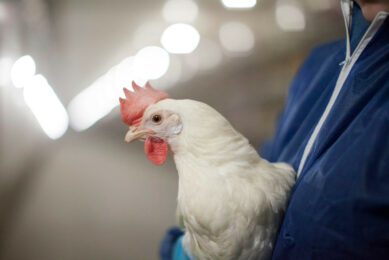Glycerol
Biodiesel that is produced from oil that is chemically treated with alcohol or methanol produces a co-product called glycerol (glycerine).
Glycerol is a valuable by product, which can be used in ruminant, pig and poultry diets.
Cows
Already 50 years ago, researchers showed that glycerol may help to prevent keto-acidosis in the high yielding cow by increasing glycose precursors. However, recent research on glycerol shows that this glycerol fed to growing bulls and dairy cows produces various results. Therefore, more research is needed to elucidate the conditions under which glycerol may be used as a feedstuff as opposed to the well established use as a feed additive.
Chickens
Glycerol can also be used as a dietary supplement for growing broiler chickens, according to research by University of Arkansas Division of Agriculture poultry scientists. According to Park Waldroup, poultry nutritionist for the UA Center of Excellence for Poultry Science, glycerol is a safe feed additive. He stated that glycerol is a pure calorie source that can provide energy to a body for maintenance and growth of chickens.
In a short-term preliminary study, Waldroup and his research group found that they could feed up to 10% glycerine to chicks up to 16 days of age without impairing performance. This was followed by a full-term feeding study with chicks grown to market age to evaluate the effects not only on live performance but also on meat quality.
"Results of the study showed that diets with 5% glycerine supported good performance, but when 10% was added to the diets, the flow rate of the feed was slightly reduced, hampering feed intake," Waldroup said. "Neither level of glycerine had any adverse effects on meat quality."
Results of the studies indicate that glycerine can be used as an energy source for broiler diets, Waldroup said, but additional research is needed to evaluate quality issues associated with its use and the effects on such features as feed texture and pellet quality.
Pigs
Feeding up to 10% technical grade glycerol in growing finishing pigs as a replacement of cereal energy sources has resulted in comparable performance and slightly improved carcass characteristics (less dripping and water loss).
Nevertheless, the use of technical grade glycerol in nursery diets should be limited to no more than 6% until further research clearly indicates otherwise.
Available articles /blog:











